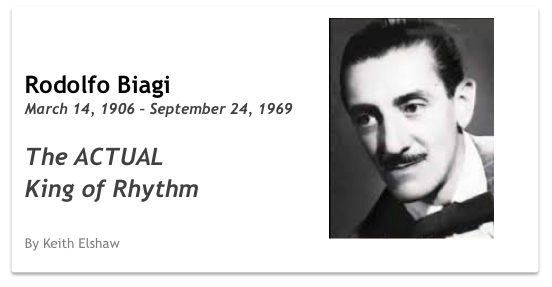I would hope that even people who think they don't like Biagi (I've met some) will hear how great his music is when remastered. HIs intention just makes you say, I need a partner right now. I find his rolling rhythmic pulse with synchopation over-lay irresistable. He takes you on a wild ride and yet it is all so gentle and obviously thoughtful. He's not a show-off like his imiators, he's friend taking you down paths you haven't been before.
In his teens Rodolfo played in silent cinemas before being being brought into the famous Juan "Pacho" Maglio orquesta. He then joined Juan Canaro before moving to the D'Arienzo orquesta in December, 1935.
I've written about the years of success Rodolfo had and his incredible influence on ALL of tango arranging and playing piano on D'Arienzo's biggest hits.
It is apparent he wasn't driven by money or stardom. He could easily have come out with a big band of 15 musicians and impress everybody with the same huge sound he made the big D'Arienzo orquesta. But that wasn't him. Been there, done that, one supposes
The general public of course will think 15 players sound much better than 2 bandoneons, 2 violins, a bass and a piano, a singer. But that smaller level of financial pressure is what Biagi chose to support. He was making music, not trying to rule the world, be the king. His legacy is misunderstood for this very reason. But he consciously chose to do this.
Biagi obviously loved subtlety; harmony; his own particular rhythmic signature. And what rhythm! As a musician, he is just a creative, light-hearted, inspiring genius; felicitous texture, somehow full of oxygen for dancers; and music that speaks to the heart.
Yes, his sound was stripped-down because of the number of instruments, but his records sure don't suffer for lack of glorious harmonies in the strings, amazing bandoneon parts, arrestingly playful piano voice - all the things he gave D'Arienzo.
Luv hearing the bandoeon breaths - which you can't discern when record scratches are present. Using noise-reduction software to clean it would just wipe those sensitive sounds out.
I would just say one other thing about why he didn't seem to become a big deal with his own band except for lovers of great music who have very good ears:
In 1939 everybody in the world had a little problem descend on them which changed everything. It lasted for 6 years and drastically diminished the world-around phenomenon of partner dancing. It fundamentally killed the Big Band dance orchestras in every country in the world. End of an era.
One cannot say, Biagi couldn't have been so great because he didn't become a zillionaire! - or you'd have to say that Benny Goodman and Duke Ellington failed too after the war because they also drastically down-sized. It is not a valid assertion.
So. Keith's Biagi appreciation crusade continues, now in it's 16th year. (As with my Donato, Laurez and Podestá campaigns - results).
It was understandable that many didn't like the thin and noisy sound of Biagi's cds. I've always prayed those people will give him another listen when all that stuff is taken away and the delicate sound given a chance to impress once again.
Rodolfo Biagi is one of the greatest layerer of complex dance rhythms and harmonies who ever lived. His body of work and legacy proves it. If you love creative, unique and personal, ya gotta love Biagi. Argentinos certainly did (do); he was popular on TV for many years.

